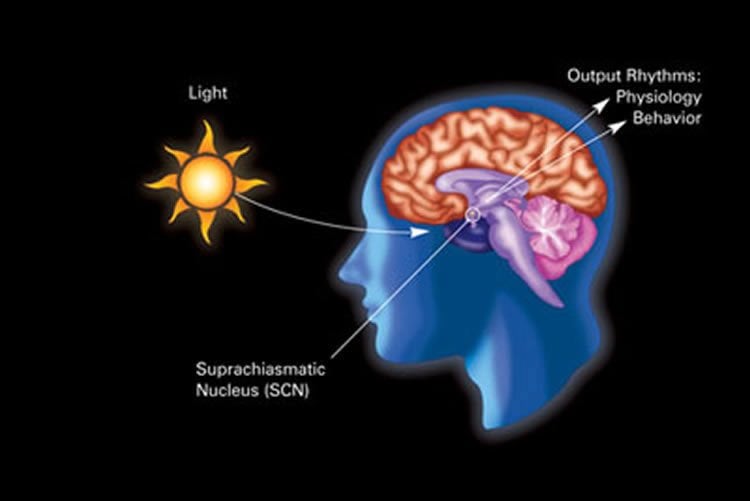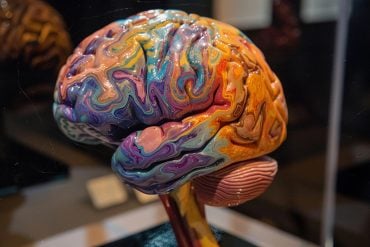Summary: Changing the circadian clock in the liver of mice alters the way the body responds to diet and also changes the gut microbiota, a new study reports.
Source: Baylor College of Medicine.
Researchers at Baylor College of Medicine have discovered that changing the circadian clock in mouse liver can alter how the body responds to diet and also change the microbes living in the digestive track. In this study, which appears online in the American Journal of Obstetrics and Gynecology, the researchers show for the first time that a liver gene in mice has the ability to link the circadian system, the microbiome and the mouse metabolism under dietary restrictions. What is surprising is that it does so in a sex-specific fashion.
“Organisms can change how their bodies process food in different ways,” said first author Dr. Derek O’Neil, a postdoctoral fellow in obstetrics and gynecology at Baylor. “Here, we studied two of those strategies. One involves the circadian clock, the internal mechanism that helps orchestrate body activities such as going to sleep or when to eat. Another aspect that can affect how we metabolize our food is the microbiome, the bacteria that live in the body.”
Previous studies have shown that, independently, the circadian clock and the microbiome can affect metabolism. In this study the researchers explored whether changing the circadian clock would affect the microbiome.
Disrupting the circadian clock in mouse liver alters the gut microbiome
To investigate the connection between the circadian clock and the microbiome, the scientists genetically engineered mice to lack only in the liver a gene involved in circadian rhythm, the Npas2 gene. Then, they determined the effect of lacking the gene in a traditional test for circadian genes. In the test, called restricted feeding, normal feeding hours were disrupted. Instead of having access to unrestricted amounts of food for 12 hours at night (the normal feeding time for mice), the mice had access to food for four hours during the day.
Two groups of mice went through the restricted feeding test for 17 days, the mice lacking the Npas2 gene and normal mice. Before, during and after the test, the researchers took stool samples where they determined the type of microbes present and measured how much food the animals ate and how much they weighted.
The results showed that altering the circadian clock in the liver results in changes in the gut microbiome; the mice lacking the Npas2 gene had microbial communities in their stools that were different than those in normal mice.
In addition, even though both groups of mice ate about the same amount of nutritionally balanced food and lost weight during the restricted feeding test, the mice lacking the Nasp2 gene lost less weight than the normal mice.

“Lacking a gene in the liver that drives the circadian clock was sufficient to not only change the resiliency of these male mice to weight loss during restricted feeding but also to change their gut microbiome,” said senior author Dr. Kjersti Aagaard professor of obstetrics and gynecology at Baylor. “This is the first scientific mechanistic study that shows clear evidence of a complex interplay between the host circadian system, the microbiome and the host metabolism when under dietary stress.”
The study has potential implications in the clinic. “We speculate that our findings may lead to solutions for people who are resistant to losing weight with restricted feeding as well as the opposite situation,” Aagaard said. “If we manipulated the microbiome, could we see lesser or more weight loss by just changing the time of feeding? Our study could also be applied to situations in which we don’t want to see weight loss, such as cancer patients receiving chemotherapy or during times in life when sleep patterns are turned upside down.”
Closer to their field of interest, pregnancy and neonatal life, the researchers further speculate that their findings may lead to more studies aimed at better understanding the intricate interactions between major disturbances of the circadian clock for both mother and child during neonatal life (when newborns are still learning day from night), the microbiome and preserving the mother’s weight and metabolism.
Other authors of this work include Christopher J. Stewart, Derrick M. Chu, Danielle M. Goodspeed, Pablo J. González-Rodríguez and Cynthia D. Shope, all from Baylor College of Medicine.
Funding: This study was partially supported by the National Institutes of Health grants 1RO1DK089201-01A, R24DK090964-06, T32GM088129 and T32GM07526-37.
Source: Jeannette Jimenez – Baylor College of Medicine
Image Source: NeuroscienceNews.com image is in the public domain.
Original Research: Abstract for “Conditional postnatal deletion of the neonatal murine hepatic circadian gene, Npas2, alters the gut microbiome following restricted feeding” by Derek S. O’Neil, PhD, Christopher J. Stewart, PhD, Derrick M. Chu, BS, Danielle M. Goodspeed, PhD, Pablo J. Gonzalez-Rodriguez, PhD, Cynthia D. Shope, MS,and Kjersti M. Aagaard, MD, PhD in American Journal of Obstetrics and Gynecology. Published online March 31 2017 doi:10.1016/j.ajog.2017.03.024
[cbtabs][cbtab title=”MLA”]Baylor College of Medicine “Circadian Clock Changes Alter Body’s Response to Diet.” NeuroscienceNews. NeuroscienceNews, 4 May 2017.
<https://neurosciencenews.com/diet-circadian-rhythm-6494/>.[/cbtab][cbtab title=”APA”]Baylor College of Medicine (2017, May 4). Circadian Clock Changes Alter Body’s Response to Diet. NeuroscienceNew. Retrieved May 4, 2017 from https://neurosciencenews.com/diet-circadian-rhythm-6494/[/cbtab][cbtab title=”Chicago”]Baylor College of Medicine “Circadian Clock Changes Alter Body’s Response to Diet.” https://neurosciencenews.com/diet-circadian-rhythm-6494/ (accessed May 4, 2017).[/cbtab][/cbtabs]
Abstract
Conditional postnatal deletion of the neonatal murine hepatic circadian gene, Npas2, alters the gut microbiome following restricted feeding
Background
We have recently shown in both non-human primates and in rodents that fetal and neonatal hepatic expression of the circadian transcription factor, Npas2, is modulated by a high fat maternal diet and plays a critical role in establishing life-long metabolic homeostasis. Similarly, we and others have also established the importance of the maternal and early postnatal diet on establishment of the early gut microbiome.
Objective
We hypothesized that altered circadian gene expression solely in the neonatal liver would result in gut microbiome dysbiosis, especially with diet-induced metabolic stress (ie, restricted feeding). Using a murine model in which we conditionally knock out Npas2 in the neonatal liver, we aimed to determine the role of the circadian machinery in gut dysbiosis with restricted feeding.
Study Design
We collected fecal samples from liver Npas2 conditional knockout (n = 11) and wild-type (n = 13) reproductive-aged mice before (study day 0) and after the restricted feeding study (study day 17). Extracted DNA was sequenced using the MiSeq Illumina platform using primers specific for the V4 region of the 16S ribosomal DNA gene. The resulting sequences were quality filtered, aligned, and assigned taxonomy. Principal coordinate analysis was performed on unweighted and weighted UniFrac distances between samples with a permutation analysis of variance to assess clustering significance between groups. Microbial taxa that significantly differ between groups of interest was determined using linear discriminate analysis effect size and randomForrest.
Results
Principal coordinate analysis performed on weighted UniFrac distances between male conditional knockout and wild-type cohorts revealed that the gut microbiome of the mice did not differ by genotype at the start of the restricted feeding study but did differ by virtue of genotype at the end of the study (P = .001). Moreover, these differences could be at least partially attributed to restricted feeding–associated alterations in relative abundance of the Bacteroides genus, which has been implicated as crucial to establishing a healthy gut microbiome early in development.
Conclusion
Here we have provided an initial key insight into the interplay between neonatal establishment of the peripheral circadian clock in the liver and the ability of the gut microbiome to respond to dietary and metabolic stress. Because Npas2 expression in the liver is a target of maternal high-fat diet–induced metabolic perturbations during fetal development, we speculate that these findings have potential implications in the long-term metabolic health of their offspring.
“Conditional postnatal deletion of the neonatal murine hepatic circadian gene, Npas2, alters the gut microbiome following restricted feeding” by Derek S. O’Neil, PhD, Christopher J. Stewart, PhD, Derrick M. Chu, BS, Danielle M. Goodspeed, PhD, Pablo J. Gonzalez-Rodriguez, PhD, Cynthia D. Shope, MS,and Kjersti M. Aagaard, MD, PhD in American Journal of Obstetrics and Gynecology. Published online March 31 2017 doi:10.1016/j.ajog.2017.03.024






